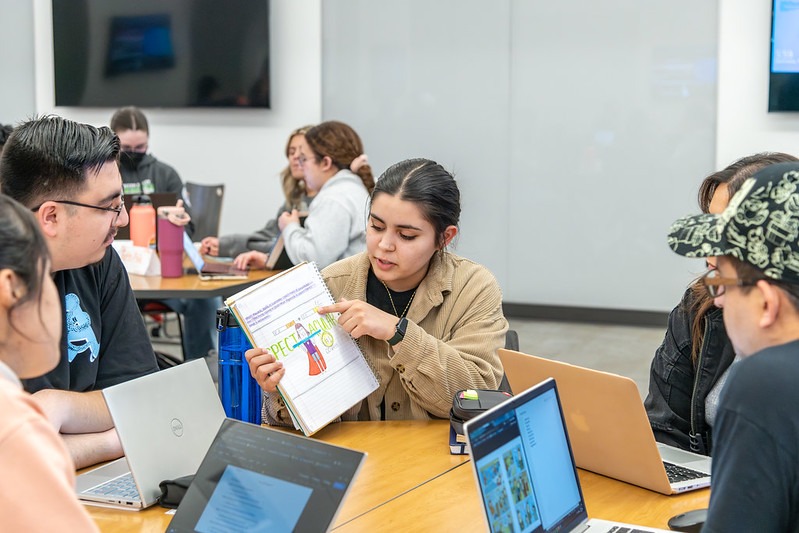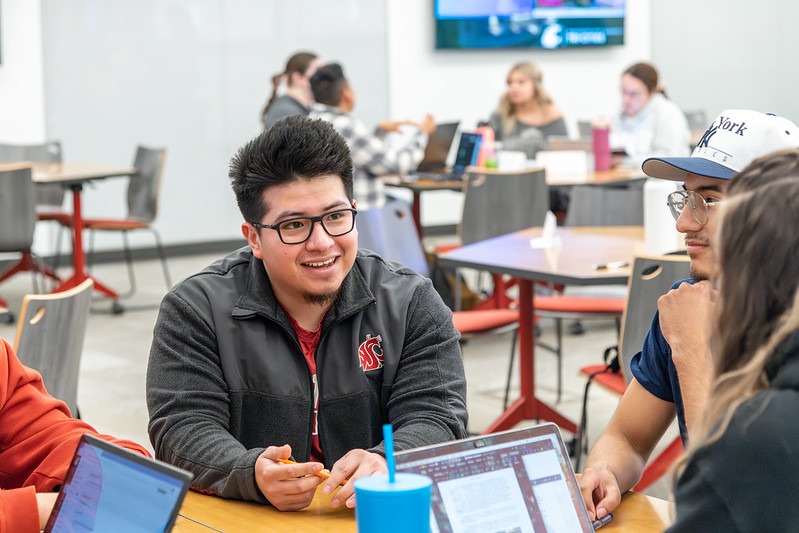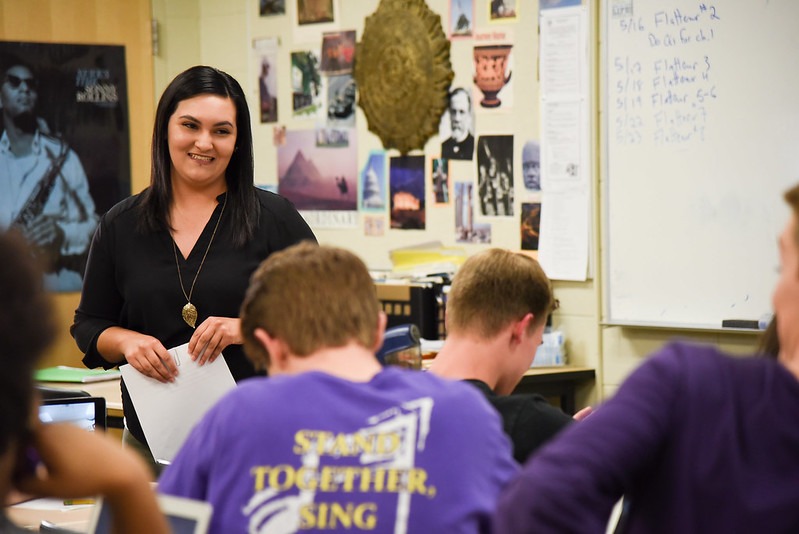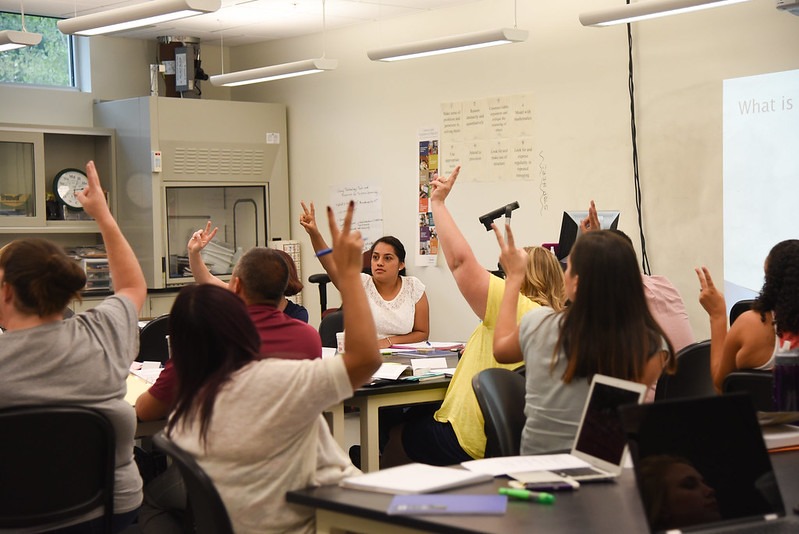

The WSU Tri-Cities Teaching Bridge program is unique opportunity for students interested in careers in teaching to:
- have support during the college application and financial aid process as high school seniors
- gain early admission to WSU Tri-Cities
- learn as a cohort and take unique support classes
- participate in paid cooperative internships in local school districts during their first two years of WSU Tri-Cities. Students typically work as a part-time substitute paraeducators in partner districts.
- early enrollment as a First Year Student in popular classes
- access mentorship opportunities
- get a competitive edge by building skills through hands-on learning in the classroom and on the job
To participate in Teaching Bridge, students must apply and be admitted to WSU and then apply to the Teaching Bridge program. The program is a partnership between WSU Tri-Cities, area school districts, ESD 123, and community-based organizations.
Pathway from high school student to elementary school teacher
High School Senior Checklist
- Complete the request for information form
- Apply to WSU Tri-Cities
- Complete your FAFSA/WASFA*
- Apply to the Teaching Bridge Program by March 31
*For scholarships, you must apply and be admitted to the University by May 1.
Year 1
- Start classes at WSU Tri-Cities
- Begin work as a substitute paraeducator
Year 2
- Continue classes at WSU Tri-Cities
- Keep working as a substitute paraeducator
- Spring: Apply to the College of Education, Sport, and Human Sciences – Alternative Route
Year 3
- Be admitted into the Alternative Route Program
- Work as a full-time paraeducator
- Continue education full-time (competency-based curriculum: show you know it, document it, and get credit for it.)
Year 4
- Work full-time as a paraeducator
- Complete student teaching
- Graduate with a degree in Elementary Education and with two endorsements in either English Language Learners, Bilingual Education, and/or Special Education
- Apply for a job as a teacher
Courses
As part of the Teaching Bridge program, students are automatically enrolled during the Fall of their first year in University 104, a special support class to help them transition successfully into WSU Tri-Cities. Students also have reserved seats in popular classes for required education prerequisite courses as well as early access to courses in the Education department. Each student will work with an academic advisor to create a personal plan of study.
The academic courses in science, English, mathematics, social sciences, and arts you will take during the first two years of Teaching Bridge provide students with the broad foundation of academic content needed to teach the subject matter in the K-8 curriculum in Washington State. The Teaching and Learning courses provide the broad foundations for the field of education and provide context to the experiences on the job. During the first two years of the Teaching Bridge Program, in addition to the UCORE classes students have the opportunity to take the following classes:
Univ 104
Explore how to successfully navigate college; topics include student identity, cultural lenses, academic skills, university resources; utilizes a collaborative learning environment.
Teaching & Learning 301
Analysis of the connections among learning theories, human development theories, and educational practice in today’s Pre-K to 12th grade classrooms.
Teaching & Learning 307: Survey of Children's Literature
Types, values, selection of children’s literature; the role of teacher in facilitating children’s experiences with books.
Teaching & Learning 330
Social, historical, and philosophical foundations of gender, socioeconomic, linguistic, and culture in schools
Answering questions such as: How are schools influenced by larger societal and cultural patterns of interaction between educators and the communities where their students live? How can teachers better understand their students’ backgrounds to enhance their learning and social experiences in school? What can teachers learn from their students to improve their own professional practices?
This course can be taken in either Spanish or English. If taken in Spanish, it can count towards the dual pathway certificate.
Teaching & Learning 333: Introduction to English as a Second Language (ESL)
Foundations of ESL with attention to basic concepts of second language processing in educational settings.
Answering questions such as: What is the role of language(s) in education? How does academic language differ from other forms of language use? How can teachers draw on their students’ community language abilities to enhance the students’ academic experiences?
Special Education 301: Education of Exceptional Children
Survey of characteristics of students with disabilities, and overview of programming, legal aspects, and methods of instruction.
Answering questions such as: What important role federal laws and related regulations have played in the provision of educational services to students with disabilities? What are the characteristics and educational needs of students with different disabilities and other exceptional leaners? What are strategies or evidence-based teaching practices that teachers can use to support students with disabilities and others who struggle to learn?
Internship
Teaching Bridge students participate in an internship working in partner school districts. Most often, this is the district where the student graduated high school. Students must fill out and complete the job application form on the District website and complete all requirements for district hiring, including fingerprinting. Students may indicate a preference for a school to work at, but there are no guarantees. Consideration will be given to transportation constraints whenever possible.
Certificates
Students will earn a B.A. in Elementary Education with an endorsement in Elementary Education and a secondary endorsement of the student’s choice area in:
- English Language Learning
- Bilingual Education
- Special Education
- Middle-Level Math
- Middle-Level Science
Students who are multilingual may also earn a Dual Language Pathway Certificate.
Paying for your education degree
There are several ways students pay for their education degree. These are primarily through financial aid, grants, scholarships, and work. It is very important that you fill out the FAFSA or WSAFA and then the WSU Scholarship application (due January 30). The College of Education, Sport, and Human Sciences Financial Aid and Scholarships page has many helpful links to get you started. Also, you can apply for the many community scholarships that are in our region.
Washington State also has several options for conditional scholarships for future teachers. Washington State Educator Workforce Program (EWP) provides financial aid to attract and retain teachers to work in subjects or locations of high need known as shortage areas. These funds are conditional scholarships, which means that they are loans that are forgiven in whole or in part in exchange for service as a certificated employee in an approved education program. You can apply for these scholarships once you are admitted into the education major.
After graduation with your education degree, many new teachers can participate in the Teacher Loan Forgiveness Program. If you teach full-time for five complete and consecutive academic years in a low-income school or educational service agency, and meet other qualifications, you may be eligible for forgiveness of up to $17,500.
Contact us
WSU Tri-Cities College of Education, Sport, and Human Sciences
Teaching Bridge Program
tricities.fieldservices@wsu.edu
The Teaching Bridge received $155,526 of funding from the U.S. Department of Labor WIOA Title IB Total Allocation PY23 Career Connect Washington Program Builder grant. Read more about USDOL grant funding at esd.wa.gov/usdol.








